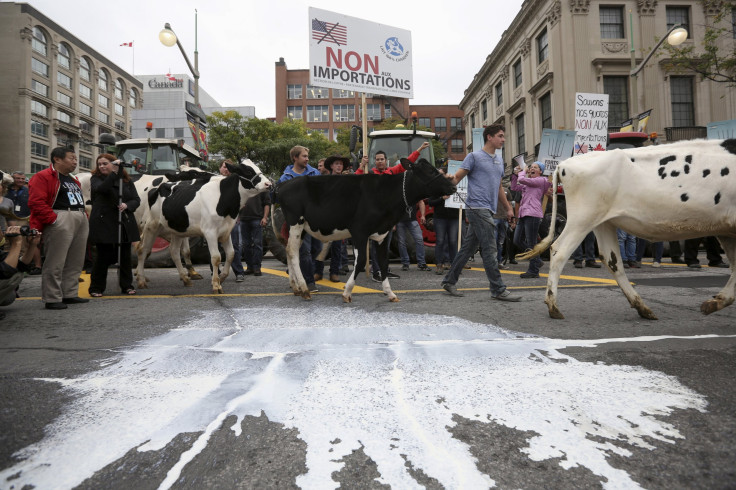Trans-Pacific Partnership: Dairy Products Emerge As Latest Sticking Point In TPP Trade Negotiations

ATLANTA --The toughest item standing in the way of a landmark free-trade agreement among 12 Pacific Rim countries is entirely prosaic: milk. As trade ministers gather in Atlanta this week, pressure is mounting on the United States, as the leading proponent of the Trans-Pacific Partnership (TPP), to break a longstanding impasse over trade in milk-based products such as powder, whey protein and cheese. National systems of quotas and tariffs have long coddled the sector, and major exporters including Australia and New Zealand would like to see the restrictions melt away, but they face opposition they argue only the U.S. can break.
“It’s all up to the United States,” said Brent Finlay, president of the National Farmers’ Federation of Australia, who made the 20-hour trip to Atlanta to press his case. “They need to be the ones to close the deal.”
Citing the 7-year duration of the negotiation, Finlay added, “Either we make history here, or the TPP is history.” The meeting, initially scheduled to wrap up Thursday, appears likely to drag into another day.
The trade ministers, hosted by U.S. Trade Representative Michael Froman, hope the Atlanta meeting will end with an agreement smoothing the way for 40 percent of global output by lowering tariffs, strengthening patent laws and protecting cross-border digital commerce.
The Pacific trade talks, which don’t include China but do embrace Japan, Malaysia, Vietnam and other Asian nations, are a chief second-term priority of U.S. President Barack Obama, who has sought to rebalance American diplomatic and military resources away from Europe toward fast-growing Asia where China is the hub of economic activity.
A similar meeting in July in Hawaii resolved differences across most of the roughly 30 chapters of the agreement -- areas such as e-commerce, investment and the environment -- but the gathering ground to a halt amid differences over pharmaceutical patents, vehicle trade and the dairy business. Officials said solutions to the first two issues are in sight, with the dairy trade set to consume the lion’s share of their time in Atlanta.
U.S. officials have also sought freer trade in dairy products, a sector the United states protects, but have linked their concessions to changes in Canada, which limits imports and supply of milk-based goods to boost farmer incomes. Japan, in turn, has held back changes to its import barriers without changes elsewhere, generating demands from producer countries for the United States, as the host of the meeting, to break the deadlock by offering its own concessions.
Mindful of the pressure on him, the top members of the U.S. Congress for trade sent Froman a letter urging him to leave Atlanta without the deal if he doesn’t think lawmakers would approve it.
“If you are unable to obtain an agreement that is consistent with the standards we have set out, we would support continuing negotiations so that TPP meets the benchmark that Congress can support,” Senator Orrin Hatch, the Utah Republican who chairs the powerful Senate Finance Committee, wrote.
The dairy issue is a potent political problem for Canadian Prime Minister Stephen Harper, who faces an election later this month in a country where dairy farmers are numerous in the voter-rich provinces of Ontario and Quebec. Harper has vowed to preserve Canada’s global role by keeping it in the negotiation, while simultaneously promising farmers he won’t destroy their livelihood. So far, the dairy industry isn’t buying it. David Froelich, director of the Dairy Division at Teamsters Canada, said, “Free trade isn’t necessarily a bad thing, as long as it doesn’t threaten Canadian jobs and food sovereignty.”
The Harper government has responded to the pressure from dairy farmers by mobilizing other industries that stand to benefit from a big Asia-Pacific trade deal to speak out in favor of TPP. Producers of barley, wheat and other grains have exhorted the government to reach a deal, with meat producers whose animals graze Canada’s vast plains, especially vocal that the dairy industry shouldn’t drag down TPP.
Staying out of a deal is “not a viable option for the export-dependent agriculture and agri-food sector of this country,” said Joe Reda, the president of the Canadian Meat Council. “The decisions that are made this week will determine whether the sector looks backward to the past and withers or whether it looks forward to the future and grows,” Reda added.
Gerry Ritz, Canada’s agriculture minister, also signalled to anxious dairy farmers that the government would soften a Canadian system of higher imports with payments to producers. “If there is loss on your farm, (or) the processing side, you will be compensated,” Ritz said in Ottawa, Reuters reported.
In New Zealand, a milk-producing powerhouse, exactly the opposite political dynamic is underway in which its top official in Atlanta, trade minister Tim Groser, has prepared his dairy farmers for a measure of disappointment because the TPP won’t dismantle dairy industry protectionism entirely.
“We will try and get the absolute best possible deal,” he told the New Zealand Herald. “It will not be a gold-plated deal."
Groser’s warning underscored the perils of any country demanding changes at the moment of truth in a complex negotiation: time works against them. That’s one reason lobbyists from Australia and New Zealand’s dairy business are prowling the lobby of the Westin Peachtree Plaza to repeat their case for fewer trade barriers.
“This is a major industry for us, a nation of 4.5 million people,” said Mike Petersen, New Zealand’s special agricultural trade envoy, an industry representative. “We have to fight hard.”
© Copyright IBTimes 2024. All rights reserved.




















